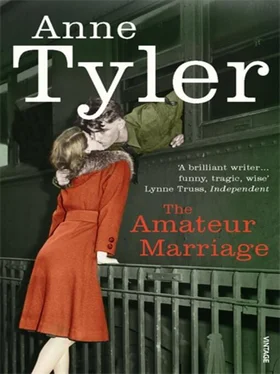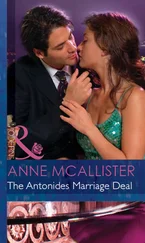One of the cosmetics counters was offering free makeovers. A woman was being swabbed with foundation while several other women watched, and Pauline slowed to watch too but only for a moment. Then she walked out of the store and found her car. She drove home the longer, prettier way; well, partly because it was prettier and partly because she took a wrong turn. The radio was playing oldies that celebrated spring, and she started singing “April Love” in harmony with Pat Boone and forgot to watch where she was going.
As soon as she reached the house she telephoned George again. This time he answered. “Oh! Mom! Hi!”—all surprised and innocent.
“Did Sally tell you about my water heater?” she asked him.
“Water heater? No-o-o. She did leave a note saying to call you and I was going to do that, I was just about to, as soon as I finished—”
“I have absolutely no hot water. It stays cold no matter how long I run it.”
“Ah.”
She waited a moment. “What should I do?” she asked finally.
“Well. That may require a plumber, Mom.”
“A plumber! Oh, God. A plumber on a Saturday; you know what he’s going to say. He’ll say he can’t come till Monday and that means a whole entire weekend without—”
“Of course it could be just the pilot light,” George told her.
“Pilot light?”
“What’s happening in the basement, do you know? Is there water on the floor? Because if there is, you’ll probably need a new unit; but if there isn’t, it might be just the pilot light and that’s a very simple matter.”
“Oh, maybe it’s the pilot light,” Pauline said.
“Is there water on the floor?”
“I’m not sure.”
“You’re not sure,” George said.
“I’m scared to go see.”
“Mom,” George said, too patiently.
“All right! All right! But you stay on the line, okay?”
She laid the receiver on the kitchen counter and walked down the corridor to the basement stairs. Three steps from the top, she stopped and held her breath and listened, but she didn’t hear anything alarming. The rec-room carpet — a flat, fuzzy green like the surface of a pool table — looked dry from where she stood; so she took heart and descended the rest of the way. She tiptoed across the rec room and peered through the doorway to the left of the bar. There the machinery of the household — the furnace, water heater, washer, and dryer — hulked in the dim light from the single high window. The concrete floor was not even damp. She detected no smell of gas. Maybe things were not so bad after all.
“It must be the pilot light,” she told George when she got back to the phone.
“Well, good. All you have to do is relight it, in that case.”
“Me?”
“You know how to strike a match, Mom.”
“I’m scared it might explode.”
George made her wait through several seconds of silence. Then he said, “All right. I’ll come do it myself.”
“Oh, thank you, sweetie!”
“But first I want to finish up here. I’m trying to get a doghouse assembled before they bring home the puppy.”
“How long will that take?” Pauline asked.
“Couple of hours? I don’t know.”
“The reason I ask is, I’ve got lunch with the girls in…” She glanced at her watch. “Just over an hour.”
“Fine. I’ll come once you’re back.”
“No! Wait! How will I shower and dress for my lunch? Can’t you come now instead?”
“No, I can’t,” George told her.
“Oh, George.”
“I promised Sally I would do this,” he said. “You call me when you get home again and I’ll come right over, I promise.”
“Well. All right, I guess,” she said.
She hung up very slowly and sadly, as if he could see her.
It was Katie Vilna’s turn to be hostess, and as usual she had gone all out: cocktails with umbrellas in them, and gigantic floral arrangements everywhere you looked. (Katie had a habit of marrying rich. She lived in Ruxton now and her house was a real showpiece.)
They had long ago abandoned any pretense of cardplaying. First they had drinks in the living room (grand piano, Persian rugs, uncomfortable Victorian furniture studded with glass-headed tacks that dug into your back), and then they went into the dining room. The floral arrangement there was so towering that Katie had to remove it so they could see each other. Katie herself sat at the head of the table, wearing a flowing caftan that might have been a bit too eveningy for a ladies’ luncheon. Wanda, who had given up trying, slouched at her right in a baggy denim skirt and a big green cardigan, and across from Wanda sat Marilyn, a shadow of her former self after undergoing chemo for breast cancer. Her hair stuck out all over her head like a baby chick’s feathers, and instead of one of her tony pants sets she wore a sweat suit. Pauline had the seat at the foot of the table. She had stayed in her slacks but exchanged her T-shirt for a dressy red polyester top, with a paisley silk scarf fashioned into a sort of headband that she hoped would hide the fact that she hadn’t shampooed.
At first the talk was all Marilyn’s health; they had to get that out of the way. Was she feeling less tired? What tasted good to her? She really ought to eat more. “I can’t,” she told them. “I try, but even the idea of food makes me want to throw up. Sorry, Katie,” because she hadn’t touched Katie’s famous Crab Salad on Avocado Spokes.
Pauline could see everyone thinking how nice it would be not to feel hungry, and then deciding against voicing the thought. Oh, by now she knew these women so well! It was funny, though, that her closest friends were people from the St. Cassian stage of her life. She used to be tired to death of Poles — their unspellable, unpronounceable names, their oompah music, their heavy food, their folksy costumes on holidays — but now any time she heard the jiggety-jig of an accordion she got all weepy and sentimental.
And Wanda, with her “You should start eating yogurt, Marilyn. I’m going to give you the name of this really healthy brand that’s got special beneficial bacteria…” Granted, Wanda could be bossy, and Katie had a trashy streak, and Marilyn was given to boasting too much about her children; but Pauline had lost the ability to pass judgment on these women. She didn’t even know if she liked them, in fact, and perhaps she didn’t like them, but by now it hardly mattered because how would she ever start over with somebody new, at this point?
Katie asked if they had noticed what a wide range of life events the four of them had experienced. “We’ve got a widow here”—nodding toward Wanda—“two divorcees, one of them remarried and one not, a child who’s died, a child who’s vanished, a hysterectomy, and now a case of cancer.”
“Someday,” Marilyn said, “it will be one of us who dies.”
Only she was brave enough to state it.
And since once again Pauline knew what everyone was thinking (it would be Marilyn herself who died, most likely), she jumped in to change the subject. “Say! Guess what! Tonight I’ve got a date!”
“Who with?” they all wanted to know.
“Well. There’s this man at my church? Dun Osgood? He and his wife moved here a couple of years ago from Minnesota. And his wife died last Christmas — completely out of the blue, a heart attack in her sleep after a nice Christmas meal. So ever since then I’ve tried to make conversation with him, told him how sorry I was, asked how he was managing; and last Sunday he came up after services and invited me out to dinner.”
“So, let’s see,” Wanda said, counting on her fingers. “January, February, March… four months. That’s an awfully short mourning period, if you want my honest opinion.”
Читать дальше












